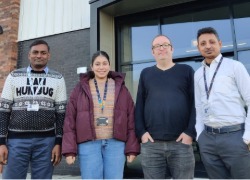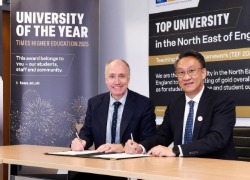Success for company which grows ‘soap’ from bacteria
A company which has developed a ground-breaking way of growing ‘soap’ from bacteria has been shortlisted for a prestigious award.
TeeGene Biotech, a Teesside University spin out venture, has developed unique strains of bacteria which produce biosurfactants, which act like soap and help to emulsify different liquids.
Unlike, traditional surfactants which are made using synthetic materials, biosurfactants can be manufactured in a laboratory and are fully biodegradable and have minimal impact upon the environment, making them much more economical and efficient.
TeeGene Biotech’s unique way of processing the biosurfactants means the company is able to scale production to meet the demands of industry ranging from cosmetics to biopharmaceuticals.
Other uses include oil recovery, reducing pollution and food processing. TeeGene Biotech’s pioneering research has seen the company reach the finals of the Industrial Biotechnology Leadership Forum (IBLF) awards which take place at the Industrial Biotechnology Showcase in London on 11 and 12 February.
The event brings together leading figures from industry, academia and government agencies and will be opened by Rt Hon George Freeman, the Minister for Life Sciences.
Each of the finalists will take part in a five minute Dragons’ Den style pitch to judges.
Dr Pattanathu Rahman, Founding Director of TeeGene Biotech, is a Senior Lecturer in Process Engineering and Biotechnology at Teesside University with 20 years of research experience on novel biotechnological approach in bioproduct development, and a recipient of a Society for Applied Technology Award of Excellence in Microbial Biotechnology.
He said: 'It’s a great honour to be invited to these awards, there will be leading figures from all over the UK from the biotechnology industry. As a relatively young company it’s fantastic that we’re already getting this recognition.'
TeeGene Biotech was formed in December 2014 and is based in the Wilton Centre at Redcar.
The company is also developing links with the National Biologics Manufacturing Centre, which is under development adjacent to Teesside University’s campus in Darlington.
The biosurfactant market in Europe is already worth £511m and is expected to grow to £1.35bn by 2030.
Dr Rahman added: 'The levels of purity needed for biosurfactants in the industries in which they’re used is extremely high. Because of this, they can be very expensive. However, the methods we have of producing them, make it much more economical and cost efficient.
'It’s a very exciting technology with tremendous potential for applications in a range of industries.'
 Groundbreaking project to unlock nuclear energy's role in
...
Groundbreaking project to unlock nuclear energy's role in
... Start the new year by expanding your knowledge
Start the new year by expanding your knowledge  Teesside University strengthens long-standing partnership
...
Teesside University strengthens long-standing partnership
...